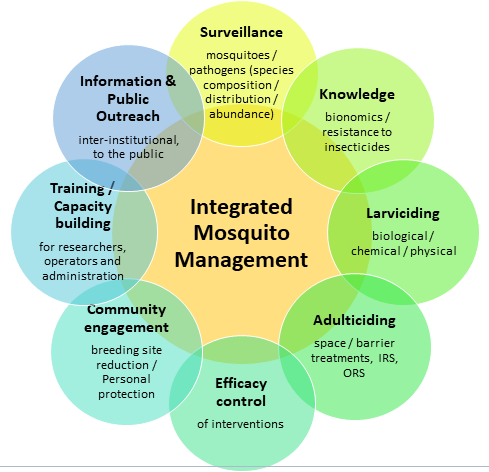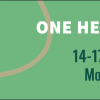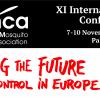
Best Practices Working Group (WG)
BEST PRACTICES-WG
The presence of mosquitoes in vicinity to human or animal installations often represent a problem of nuisance and increasingly a risk for public health and animal health [1].
Globalisation, climate change and urbanization have led to the emergence and re-emergence of mosquito-borne diseases (MBDs) in Europe, and to the introduction, establishment and spread of invasive mosquito species, potential vectors for MBDs [2]. During the last decades an increasing number of autochthonous cases of MBDs is being recorded in Europe [3] which are transmitted by invasive and native mosquito species [4], and in the absence of vaccines or treatments for MBDs, Mosquito Control can be an efficient tool for the prevention of MBDs, if implemented well [5].
Why do we need Best Practices?
Integrated Mosquito Management (IMM) is an approach in which on the basis of entomological evidence a combination of different control practices are applied to mitigate the negative effect mosquitoes can have.
However, due to a plethora of available control tools which need to be implemented in specific settings and periods and in absence of one magic solution, without the adequate evidence for decision-making there is a risk for a suboptimal choice and/or timing of interventions, which may result in the waste of valuable resources [6].
The Best Practices Working Group of the EMCA searches to fill the gap in updated, evidence-based best practices for mosquito control in the European context, that is being identified until recently by different networks and institutions [7], [8].
Who is the Best Practices WG made up for?
Mosquito control operators, researchers from the field of entomology, vector-borne diseases and/or One Health, representatives of the mosquito control industry, of public health institutions and of regional and national administrative bodies, or with one short sentence: everyone involved in mosquito control!
Purposes of the Best Practices WG
- To provide information about Best Practices for mosquito control
- To continue and enhance the interaction with EMCA members from different backgrounds we inaugurated at the 10th EMCA workshop in Mendrisio
- To discuss Best Practices for mosquito control with professionals and researchers with expertise in different fields
- To report and discuss experiences in the field of mosquito control
- To develop a reference document for national, regional and local authorities procuring mosquito control projects
- To work out concrete suggestions to be included in the Best Practices document the EMCA will develop supported by WHO
Chair: Sandra Gewehr, President-elect, Greece
For joining the WG follow the instructions here.
References
[1] EMCA/WHO. Guidelines for the Control of Mosquitos of Public Health Importance in Europe 2013:46.
[2] ECDC. Guidelines for the surveillance of invasive mosquitoes in Europe. Stockholm 2012:100. https://doi.org/10.2807/ese.17.36.20265-en.
[3] ECDC, EFSA. Surveillance Atlas of Infectious Disease. Eur Cent Dis Prev Control 2023. https://atlas.ecdc.europa.eu/public/index.aspx (accessed April 30, 2023).
[4] ECDC. Guidelines for the surveillance of native mosquitoes in Europe. Stockholm 2014:119. https://doi.org/10.1186/1756-3305-6-209.
[5] WHO. Global Vector Control Response 2017-2030. 2017.
[6] WHO. Handbook for Integrated vector management. Geneva, Switzerland: WHO; 2012.
[7] Wint W, Petric D, Caputo B, Erguler K, Gunay F, Kavran M, et al. A questionnaire-based survey of surveillance and management of Aedes invasive mosquitoes in Europe i. 2020.
[8] ECDC. Vector control practices and strategies against West Nile virus. 2020.
Latest News
23rd ESOVE Conference
20/01/2024XI INTERNATIONAL EMCA CONFERENCE & 4th EMCA TRAINING COURSE, PALMA, MALLORCA, SPAIN 3rd ANNOUNCEMENT
01/06/2023, Last update: 26/09/23RESULTS OF PRESIDENT ELECT ELECTIONS 2023
01/09/2023EMCA office
12 rue des Pucelles
67000 Strasbourg, France
EMCA office, c/o - Ecodevelopment SA
PO BOX 2420
57010 Filyro, Thessaloniki, Greece
(+30) 6970 975 001 office@emca-online.eu











